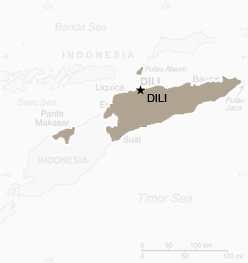

Timor-Leste
Timor-Leste
Capitale Dili
Population 1.1 million
Espérance de vie 67.27
L'accès à l'eau potable 62%
L'alphabétisation des adultes 58.6%
Mortalité des moins de 5 ans 40.65 per 1,000 live births
PIB par habitant $2,300

 La présente évaluation vise à l’acquisition de connaissances, avec pour objectif :
1) d’évaluer, au niveau national, la contribution du F-OMD à la réalisation des OMD, des principes de la Déclaration de Paris et de l’initiative réformatrice de l’ONU « Tous unis dans l’action »
2) de recenser les meilleures pratiques et les leçons apprises afin d’éclairer toute future programmation pour le développement
3) de relier les interventions programmatiques locales aux processus nationaux d’élaboration des politiques en mettant en évidence les initiatives pilotes qui ont donné de bons résultats et peuvent être reproduites à plus grande échelle.
La présente évaluation vise à l’acquisition de connaissances, avec pour objectif :
1) d’évaluer, au niveau national, la contribution du F-OMD à la réalisation des OMD, des principes de la Déclaration de Paris et de l’initiative réformatrice de l’ONU « Tous unis dans l’action »
2) de recenser les meilleures pratiques et les leçons apprises afin d’éclairer toute future programmation pour le développement
3) de relier les interventions programmatiques locales aux processus nationaux d’élaboration des politiques en mettant en évidence les initiatives pilotes qui ont donné de bons résultats et peuvent être reproduites à plus grande échelle.
Timor Leste_Country Final Evaluation.pdf (1.45 MB)-
Fiche d'information du pays
 This Fact Sheet summarizes the key achievements of the Joint Programmes in Timor-Leste.
This Fact Sheet summarizes the key achievements of the Joint Programmes in Timor-Leste.
Timor-Leste Joint Programmes Fact Sheet.pdf (144 KB)